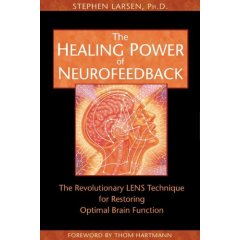 It is sheer delight for me to just delve into Stephen Larsen’s new book and travel with him the remarkable journey of Len Ochs and his colleagues in the discovery and exploration of the LENS technique (which stands for Low Energy Neurofeedback System). No one could have ever predicted where the initial speculations might eventually lead. In retrospect, the journey represents an almost picture-book case of how clinical research should ideally be conducted. It may not look quite so ideal to those who actually went through it. The personal and financial crises that may have been strewn across the path along the way are mercifully not recounted. But the process can indeed be a model to the rest of us. There was no roadmap to follow. The process was willed forward by a very determined fellow, and yet he also flogged it with skepticism every step of the way. No one applied a more thorough-going critical eye than Len himself.
It is sheer delight for me to just delve into Stephen Larsen’s new book and travel with him the remarkable journey of Len Ochs and his colleagues in the discovery and exploration of the LENS technique (which stands for Low Energy Neurofeedback System). No one could have ever predicted where the initial speculations might eventually lead. In retrospect, the journey represents an almost picture-book case of how clinical research should ideally be conducted. It may not look quite so ideal to those who actually went through it. The personal and financial crises that may have been strewn across the path along the way are mercifully not recounted. But the process can indeed be a model to the rest of us. There was no roadmap to follow. The process was willed forward by a very determined fellow, and yet he also flogged it with skepticism every step of the way. No one applied a more thorough-going critical eye than Len himself.
The initial speculations emerged out of Len’s collaboration with Harold Russell and his colleague Dr. Carter. They were making inroads on specific learning disabilities with some fairly generic audio-visual stimulation techniques at the time. The hope was to have a standard device that could be used inexpensively and across the board with lots of children. With the simple concept that one might be better off “responding” to the EEG with the stimulus rather than “driving” it open-loop, Len set out on a path that would take him to the very opposite terrain, namely toward a technique that is deployed under some fairly tight constraints and with highly individualized parameters, all done under the vigilant eye of an astute, experienced, and sensitive clinician, while taking on some of the most difficult challenges in mental health. Continue reading “The Healing Power of Neurofeedback”


